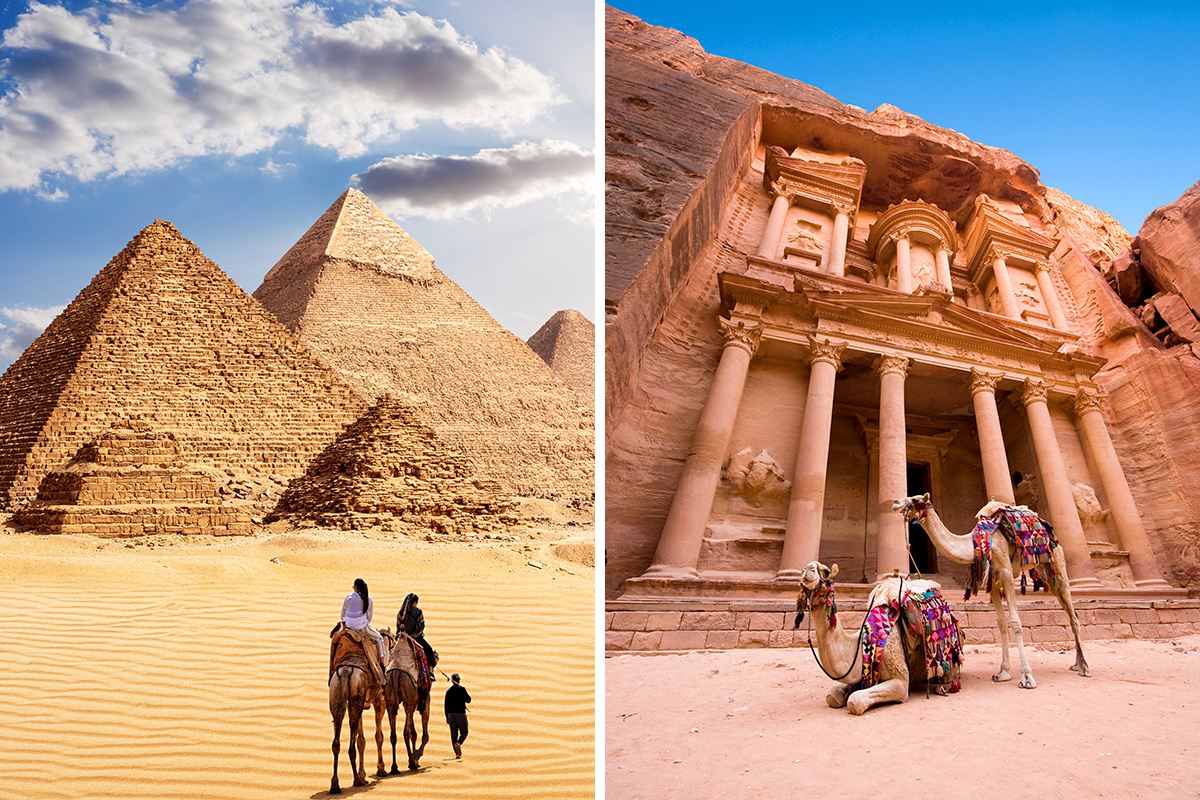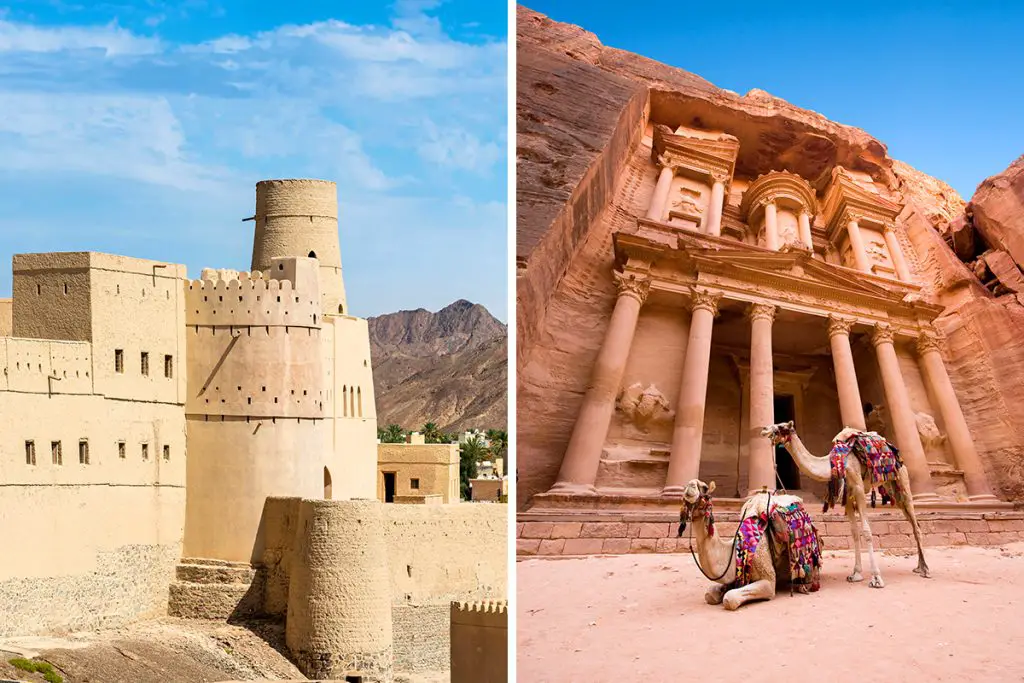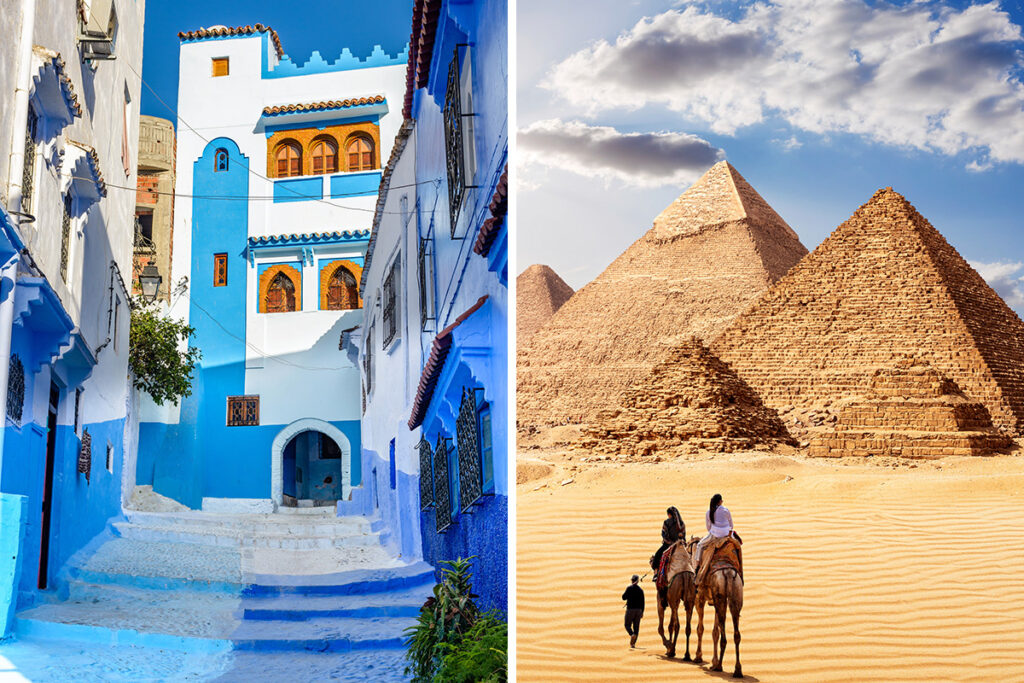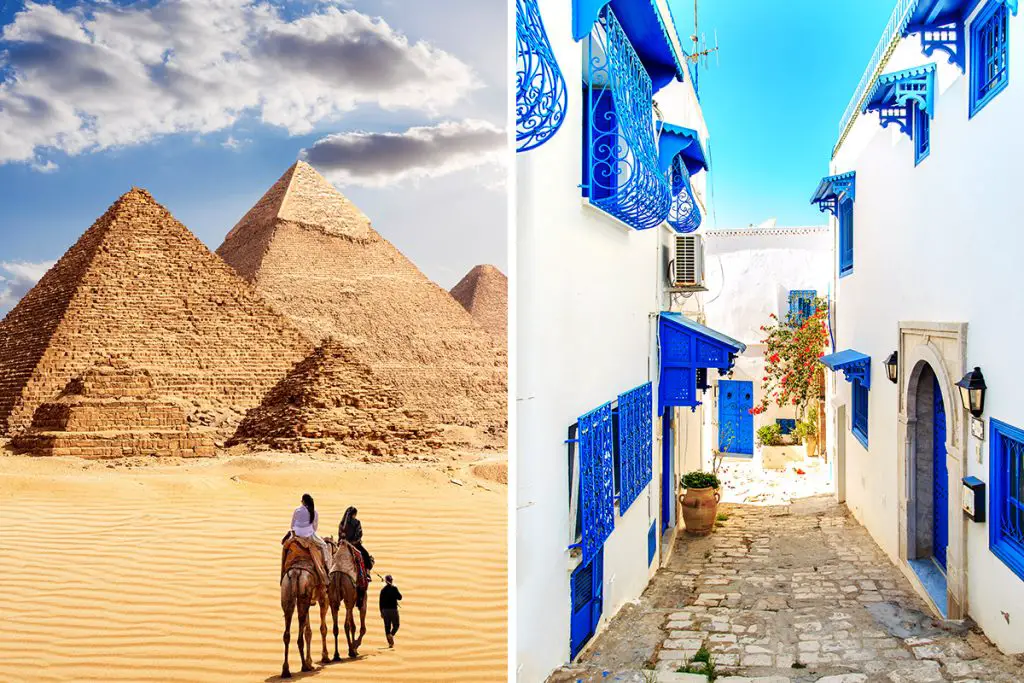This is an expedition where the destination is history itself. As you delve into the past, each turn will reveal stories hidden within the sands of time. Will you choose the land of pyramids, mummies, and powerful pharaohs, or will you be lured by the lure of ancient civilizations, a breathtaking desert landscape, and unique cultural experiences? Read on to uncover the fascinating history and culture of Egypt and Jordan.
History & Culture
The sands of Egypt whisper tales of pharaohs and their monumental pyramids, while the wind through Jordan’s ruins carries echoes of Roman and Nabatean civilizations. Both of these countries have seen the rise and fall of empires, each leaving indelible marks on the fabric of their societies.
Egypt, the cradle of civilization, is steeped in history that spans thousands of years. The ancient Egyptians left an incredible legacy in the form of the Great Pyramids, Sphinx, and hieroglyphics that continue to puzzle and fascinate the world. Their mythology, with gods and goddesses, offers a glimpse into their belief system and ways of life.
On the other hand, Jordan’s history, though less well-known, is no less rich. The Romans and Nabateans built grand structures that continue to stand tall in the city of Petra and the Roman ruins of Jerash. Their advanced city planning and water management systems reflect their intelligence and ingenuity.
Furthermore, Jordan’s Bedouin heritage lends a unique cultural perspective, evident in their traditional music, dance, and hospitality.
The culture of Egypt is a lively mix of old and new. The traditions and customs from ancient times are still prevalent in many aspects of modern Egyptian life. This blend is reflected in their music, dance, and art, showing a deep respect for their past.
Similarly, Jordanian culture is a blend of old and new, with an emphasis on hospitality and community. Their traditional music, dance, and food are a testament to their rich history and their openness to foreign influences.
In conclusion, both Egypt and Jordan offer deeply rooted histories and vibrant cultures. While Egypt’s history is widely celebrated, Jordan’s past is a hidden gem waiting to be discovered. Your journey into the past depends on whether you’re drawn to the iconic narratives of Egypt or the lesser-known but equally captivating stories of Jordan.
Attractions & Activities
When it comes to attractions and activities, both Egypt and Jordan are treasure troves, ready to be explored. Picture yourself standing in the shadows of ancient wonders or tracing the footsteps of traders on ancient routes. It’s all about choosing what resonates with your sense of adventure.
In Egypt, it’s impossible to ignore the awe-inspiring Great Pyramids of Giza and the Sphinx. These ancient structures, standing tall against the desert backdrop, transport you to the time of pharaohs.
But the journey doesn’t end there. A Nile River Cruise, not only gives you breathtaking views but also leads you to discover ancient temples and tombs scattered along the river banks. A visit to the Egyptian Museum in Cairo will add more depth to your understanding of Egyptian history with its incredible collection of ancient artifacts.
Contrast this with Jordan’s crown jewel, the ancient city of Petra. As you walk through the Siq, a narrow gorge flanked by towering cliffs, you will be greeted by the astonishing sight of the Treasury, Petra’s most famous structure.
A hot air balloon ride over Wadi Rum will offer you a stunning bird’s-eye view of the desert landscape, often described as a moonscape on Earth. The Roman ruins of Jerash, well-preserved and extensive, will give you a unique insight into the architecture and city planning of the Roman Empire.
To sum it up, both countries offer a compelling array of attractions and activities. Egypt impresses with its iconic ancient wonders, while Jordan entices with its unique blend of nature and historical sites. Your choice will depend on whether you want to stand in the shadows of pyramids or explore an ancient city carved into rock.
Beaches
When you think about the beaches of Egypt and Jordan, there are no sandy shores or waves to surf. Instead, imagine the unique experience of floating effortlessly in the waters of the Red Sea.
The beaches of Egypt, specifically in Hurghada and Sharm El Sheikh, are known for their crystal-clear waters and an incredible array of marine life. As a snorkeler or a diver, you will be treated to an underwater world of colorful corals and exotic fish species. The water temperature averages around 72°F (22°C), perfect for a relaxing dip.
Jordan’s beach experience is very different. In Jordan, the primary beach attraction is the Dead Sea. The mineral-rich waters and the therapeutic mud are renowned worldwide for their healing properties. You can float effortlessly in the sea, thanks to its high salinity. In addition, the warm temperatures, averaging 78°F (25.5°C), make it an enjoyable experience throughout the year.
In conclusion, Egypt’s beaches promise an underwater paradise for snorkelers and divers, while Jordan’s Dead Sea offers a unique floating experience with an added touch of wellness. Your preference will determine which beach experience is best for you: a vibrant marine spectacle or a restorative and relaxing soak in mineral-rich waters.
Eating, Drinking & Nightlife
Imagine you’re embarking on a culinary journey that introduces you to flavors and dishes steeped in history. The cuisines of Egypt and Jordan, though sharing some similarities, offer unique experiences that will delight your taste buds.
In Egypt, you might find yourself savoring a hearty bowl of Ful Medames, a traditional dish of cooked fava beans spiced with cumin, or maybe you’ll indulge in Koshary, a satisfying mix of lentils, rice, and macaroni topped with a tomato-vinegar sauce. Don’t forget to round off your meal with a slice of Basbousa, a sweet semolina cake soaked in syrup.
In Jordan, on the other hand, Mansaf is a must-try. This national dish made of lamb cooked in fermented dried yogurt and served over rice is a taste adventure. Also, the Jordanian version of the shawarma, served with a distinctively tangy and garlicky sauce, is a delight to the palate.
As for the drinking culture, Egyptian drink options lean more towards non-alcoholic beverages. The popular hibiscus tea and sugarcane juice are refreshing choices. In contrast, Jordan is home to some unique alcoholic drinks. Arak, an anise-flavored liquor, is often enjoyed with Mezze, a selection of small dishes served at the start of meals.
When it comes to nightlife, Cairo, Egypt’s capital, is bustling with energy. You can enjoy live music at numerous venues, watch traditional belly dancing shows, or soak in the lively atmosphere at rooftop bars. Jordan’s nightlife is a bit quieter, with Amman offering a selection of trendy bars and pubs where you can enjoy a relaxed evening.
In conclusion, both Egypt and Jordan offer captivating eating, drinking, and nightlife experiences. Whether you’re feasting on traditional dishes, sipping local drinks, or enjoying the evening buzz, the choice depends on your personal preference.
Shopping
Consider immersing yourself in the vibrant marketplaces of Egypt and Jordan, where you can not only buy unique souvenirs but also get a taste of local culture. The experience of haggling for the best price is part of the fun.
Egypt’s markets are famous for their extensive range of goods. From traditional Bedouin jewelry and hand-woven carpets to colorful glass lanterns and perfumes, you’ll find it all in the bustling Khan El Khalili Bazaar in Cairo.
Jordan’s markets, on the other hand, are known for their unique crafts and produce. The famous Souk Jara in Amman is a treasure trove of handmade ceramics, embroidered clothing, and locally produced olive oil and spices.
Yet, shopping in these two countries is not confined to traditional markets. In both Cairo and Amman, you’ll find modern shopping malls where you can shop for international brands.
In the end, both Egypt and Jordan offer a blend of traditional and modern shopping experiences. Your choice depends on whether you prefer the hustle and bustle of Egyptian markets or the laid-back atmosphere of Jordanian souks.
Accommodation
Picturing where you’ll rest your head after a day of exploration is an essential part of your travel plans. In both Egypt and Jordan, you’ll find a broad range of accommodations that can cater to different preferences and budgets.
In Egypt, from luxury hotels in Cairo that overlook the Nile River to comfortable guesthouses in the heart of historical Luxor, you’ll find a place that fits your needs. Not to mention the unique opportunity to spend a night on a traditional felucca boat, drifting along the Nile under a canopy of stars.
On the other hand, Jordan offers its unique blend of accommodations. High-end hotels in Amman provide modern comforts, while eco-lodges in Dana Nature Reserve allow you to stay close to nature. For a truly Jordanian experience, consider spending a night in a Bedouin camp under the stars in the famed Wadi Rum desert.
To sum up, your choice between Egypt and Jordan for accommodation might come down to whether you prefer the charm of floating on the Nile or the allure of a desert camp under the starry skies of Wadi Rum.
Family-Friendliness & Children’s Activities
Think about how your kids’ eyes will light up when they experience new and exciting adventures. Both Egypt and Jordan offer ample family-friendly attractions and activities that promise fun for all ages.
In Egypt, children can marvel at the colossal pyramids of Giza, enjoy a camel ride in the desert, or explore the underwater world of the Red Sea with a snorkeling trip. Interactive museums in Cairo, such as the Children’s Civilization and Creativity Center, are also designed to keep the little ones entertained.
Jordan is equally appealing for family travel. The ancient city of Petra can feel like a vast open-air treasure hunt for children, and Wadi Rum offers jeep tours that are sure to thrill. The Aqua Luna Waterpark in Aqaba is a hit with kids, offering various water slides and pools to cool off.
In a nutshell, Egypt and Jordan both excel in offering family-friendly experiences. The decision will likely hinge on whether your family is more drawn to Egypt’s rich historical sites or the natural and cultural wonders of Jordan.
Getting There & Getting Around
Now, let’s consider how you’ll reach these captivating destinations and move around once you’re there.
Whether you’re starting from New York or London, you’ll find regular flights to both Cairo, Egypt, and Amman, Jordan. The flight time to Cairo is about 12 hours (7,361 kilometers or 4,573 miles) from New York, while to Amman, it’s around 11 hours (9,041 kilometers or 5,618 miles).
Once you land in Egypt, your primary modes of transportation are taxis and Uber within the cities, and trains or flights for traveling between cities. For the ultimate Nile River experience, you could even opt for a river cruise from Luxor to Aswan.
In Jordan, on the other hand, taxis and the ride-hailing service Careem are commonly used for short trips within cities. For traveling across the country, renting a car provides the most flexibility, and there are also reliable bus services connecting major cities.
So, when considering transportation, the decision between Egypt and Jordan depends on whether you prefer Egypt’s varied options including river cruises or Jordan’s ease of self-drive options.
Weather
Imagine feeling the sun on your skin and a gentle breeze in your hair. The weather in both Egypt and Jordan plays a significant role in shaping your travel experience. These two countries, located in North Africa and the Middle East, respectively, are predominantly desert climates, but there are important differences to note.
In Egypt, summer temperatures (June to August) can soar to over 95 degrees Fahrenheit (35 degrees Celsius), particularly in the southern parts of the country. Winter (December to February), on the other hand, sees milder temperatures, averaging around 68 degrees Fahrenheit (20 degrees Celsius), making it a pleasant time to visit.
Jordan also experiences hot summers, with temperatures in Amman reaching around 90 degrees Fahrenheit (32 degrees Celsius) at the height of summer. Winters can be surprisingly cool, especially in the desert regions, where temperatures can drop to around 46 degrees Fahrenheit (8 degrees Celsius).
In summary, while both Egypt and Jordan can be hot in the summer, Egypt tends to have a warmer winter. Your choice might depend on whether you favor milder winter temperatures in Egypt or a cooler desert experience in Jordan.
Safety
Let’s talk about safety, which is always a priority. It’s reassuring to know that both Egypt and Jordan are generally considered safe for travelers, with tourism being a significant part of their economies. However, it’s always important to exercise common sense and take usual travel precautions.
In Egypt, tourist sites are typically well-guarded, and you’ll find that locals are friendly and welcoming. However, like any big city, it’s important to be cautious in crowded areas in Cairo and be aware of pickpockets.
In Jordan, the crime rate is relatively low, and the locals are known for their hospitality. It’s still advised to stay vigilant, especially in busy areas of Amman, and follow local customs and dress modestly.
Aside from crime, remember that both countries are located in desert regions, so it’s crucial to stay hydrated, use sun protection, and dress appropriately for the climate.
To conclude, both Egypt and Jordan are relatively safe travel destinations, but your decision might depend on your comfort level with big city environments versus smaller, quieter regions.
Cost
Thinking about your budget is a key part of planning your travel. Both Egypt and Jordan offer various experiences at different price points. Whether you’re a luxury traveler or a budget backpacker, you’ll find options to suit your needs.
In Egypt, your money can go a long way. For example, a mid-range hotel might cost around 600 Egyptian Pounds (about 38 US dollars) per night, and a decent meal at a restaurant could be as low as 150 Egyptian Pounds (about 9 US dollars).
Meanwhile, Jordan is considered a bit more expensive than Egypt. A similar hotel could cost around 60 Jordanian Dinars (about 85 US dollars), and a meal at a mid-range restaurant might be around 10 Jordanian Dinars (about 14 US dollars).
In short, your choice between Egypt and Jordan in terms of cost might boil down to your budget, with Egypt generally being a more budget-friendly option compared to Jordan.
Which Is Better – Egypt or Jordan?
Reaching the end of our journey, it’s time to draw some conclusions. Between the historic allure of Egypt and the captivating landscapes of Jordan, your choice may largely depend on your personal interests and travel preferences.
Looking back at history and culture, Egypt, with its ancient pyramids and rich Pharaonic heritage, is a dream for history enthusiasts. However, Jordan is not far behind with its UNESCO World Heritage site of Petra and its rich Roman history. So, if your interest lies more in Roman history and unique rock formations, Jordan could be your pick.
In terms of attractions and activities, Egypt offers world-renowned sites like the Great Pyramids and the Sphinx, while Jordan counters with the impressive Petra and the desert landscape of Wadi Rum. For beach lovers, Egypt’s Red Sea coastline offers world-class diving and snorkeling, whereas Jordan provides the unique experience of floating in the Dead Sea.
When it comes to eating, drinking, and nightlife, Egypt’s cuisine is rich and varied with bustling city nightlife, especially in Cairo. Jordan offers traditional Middle Eastern food with quieter, more laid-back evenings. If you’re a foodie with a love for energetic nights, Egypt might suit you better.
Shopping in both countries provides a unique experience. However, if you’re looking for a more varied shopping experience with both traditional markets and modern malls, Egypt might be your choice. As for accommodation, both countries offer a wide range, but for a more luxury-for-less experience, Egypt generally comes out on top.
In terms of family-friendliness and children’s activities, both countries have plenty to offer. However, if your family enjoys outdoor adventure activities, the landscapes of Jordan offer a great playground.
Finally, in terms of getting there and getting around, your choice might depend on your proximity to these countries and your preference for either exploring on your own or on organized tours.
Balancing the weather, safety, and cost, you might lean towards Egypt if you’re seeking a warmer winter getaway and a more budget-friendly trip. Jordan might appeal to you if cooler desert temperatures attract you, and a slightly higher budget is not an issue.
In conclusion, your ideal choice between Egypt and Jordan hinges on your personal preferences for history, activities, cuisine, shopping, accommodation, family activities, transport, weather, safety, and cost. Happy traveling!




